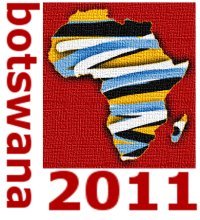WUDC 2011: And the winner is …
 There’s a whole bunch of new world champions: Team Monash A from Australia won the grand final of the open break of the World Universities Debating Championships (WUDC or Worlds). That is Victor Finkel und Fiona Prowse. In the category English as a Second Language (ESL), Michael Shapira and Meir Yarom of team Haifa A from Israel defeated all other finalists. Then there is a third world champion team: Kazushige Yoshimaru and Yuki Tominaga of Tokyo B from Japan. All three winning teams triumphed from the position of opening government.
There’s a whole bunch of new world champions: Team Monash A from Australia won the grand final of the open break of the World Universities Debating Championships (WUDC or Worlds). That is Victor Finkel und Fiona Prowse. In the category English as a Second Language (ESL), Michael Shapira and Meir Yarom of team Haifa A from Israel defeated all other finalists. Then there is a third world champion team: Kazushige Yoshimaru and Yuki Tominaga of Tokyo B from Japan. All three winning teams triumphed from the position of opening government.
The winners of the main break are experienced debaters: Victor was awarded Best Speaker at the Australasian Universities Debating Championships (AUDC or Australasians) in Auckland, New Zealand in July this year. Fiona is an Australasian Champion and was on the chief adjudication team of this year’s London Australs. The Australasians are the regional version of the European Universities Debating Championships (EUDC or Euros). Together they won the Cambridge IV in November and various national competitions.
The Israelis Michael and Meir had also made it to semi-finals (ESL) at Euros in Amsterdam in July where Michael spoke in a video interview to Achte Minute. In the previous year, Michael was a breaking judge at the Israeli National Championship 2009 and at the Yeditepe Open in Istanbul the same year. He does have a special relation to the German capital, by the way: This is where he proposed to his girlfriend Anat Gelber at the Berlin IV 2010.
A German team made it to ESL semi-finals: Stuttgart A, Michael Saliba and Andreas Lazar. On top of that, Michael (4) and Patrick Ehmann (Berlin, 5) are among the Top Five of the best ESL speakers. Andreas is first of the EFL tab.
Since 1981, debaters from all over the world have been competing at the World Universities Debating Championships (WUDC) at alternating locations across the planet. It was not before 1996 that the British Parliamentary Style became the mandatory format for this annual tournament. The African continent has been host to previous Worlds and has staged the Worlds now for a third time, this year from 27 December 2010 to 4 January 2011 at the University of Botswana, Gaborone. Language of debate is English and there are three categories: “Main” for native speakers, “ESL” (English as a Second Language, for those who prove great proficiency in English) and “EFL” (English as a Foreign Language, for those who studied English as a mere subject).
See all motions at Worlds below.
The prelims:
- Round 1: This house believes that national sporting teams should reflect the diversity of the national population.
- Round 2: This house believes that all countries should have the right to possess nuclear weapons.
- Round 3: This house believes that governments should not provide benefits on the basis of marital status.
- Round 4: This house believes that independent central banks should set limits on government spending.
- Round 5: This house would prioritise asylum seekers who have engaged in armed struggle against oppressive regimes.
- Round 6: This house would deny Teachers Unions the right to strike.
- Round 7: This house would require individuals to reveal their actual identity when communicating on the internet.
- Round 8: This house believes that the Southern Africa Development Community should pursue political union.
- Round 9: This house believes that social movements should use the courts rather than the legislature to advance social change.
English as a Foreign Language:
- EFL semis: This house supports a one state solution for the Israeli-Palestinian conflict.
- EFL final: This house would give more votes to the poor.
English as a Second Language:
- ESL quarters: This house believes that domestic courts should try foreign nationals who commit war crimes abroad.
- ESL semis: This house would prefer that the children of racial minorities be adopted by parents of that race.
- ESL final: This house believes that courts should break up consistently dominant political parties.
Open Break:
- Octos: This house would buy countries’ votes in international organizations.
- Quarters: This house believes that courts should not enforce wills that discriminate on the basis of race.
- Semis: This house opposes organised religion.
- Final: This house would invade Zimbabwe.
apf / glx





